Econometric Tools for Macroeconomic Forecasting and Simulation
This research group advances the development and application of quantitative macroeconometric models to improve the accuracy, transparency, and policy relevance of macroeconomic forecasts and simulations. Its work supports the empirical and methodological foundation of the IWH’s forecasting activities and policy recommendations.
The group focuses on both short-term forecasting and simulation-based assessments of long-term economic developments, with particular attention to the interactions between economic activity and the environment. Key areas of expertise include reduced-form models for short-term forecasting, regional disaggregation of macroeconomic trends, structural forecasting techniques, and Dynamic Stochastic General Equilibrium (DSGE) models for scenario analysis.
In addition to its core research, the group develops customized forecasting tools and conducts applied analyses in third-party funded projects. Recent collaborations include model development for Volkswagen Bank, economic ministries in Central Asia (supported by GIZ), the German Environment Agency (UBA), and the EU Horizon 2020 project ENTRANCES, which addresses clean energy transitions in European regions.
By integrating rigorous econometric methods with practical applications, the group contributes to a better understanding of macroeconomic dynamics and enhances the basis for evidence-based policy decisions at national and international levels.
Research Cluster
Economic Dynamics and StabilityYour contact

- Department Macroeconomics
EXTERNAL FUNDING
07.2022 ‐ 12.2026
Evaluation of the InvKG and the federal STARK programme
German Federal Ministry for Economic Affairs and Climate Action
On behalf of the Federal Ministry of Economics and Climate Protection, the IWH and the RWI are evaluating the use of the approximately 40 billion euros the federal government is providing to support the coal phase-out regions..
12.2024 ‐ 02.2026
Macroeconomic Modelling for Energy Investments in Vietnam
Deutsche Gesellschaft für Internationale Zusammenarbeit (GIZ) GmbH
08.2024 ‐ 03.2025
Strengthening Public Financial Management in Vietnam
Deutsche Gesellschaft für Internationale Zusammenarbeit (GIZ) GmbH
01.2023 ‐ 12.2023
Early determination of stable results for gross domestic product or real economic growth and gross value added at federal state level
Landesbetrieb Information und Technik Nordrhein-Westfalen
The project examines whether the accuracy of the first estimate of gross value added and gross domestic product for the federal states can be increased, thereby reducing the extent of subsequent revisions.
01.2018 ‐ 12.2023
EuropeAid (EU Framework Contract)
Europäische Kommission
05.2020 ‐ 09.2023
ENTRANCES: Energy Transitions from Coal and Carbon: Effects on Societies
Europäische Kommission
ENTRANCES aims at examining the effects of the coal phase-out in Europe. How does the phase-out transform society – and what can politics do about it?
This project has received funding from the European Union’s Horizon 2020 research and innovation programme under grant agreement No 883947.
10.2019 ‐ 01.2023
Climate Resilient Economic Development
Climate change has a substantial impact on economic growth and a country’s development. This increases the need for reliable and viable approaches to assessing the impact of climate risks and potential adaptation scenarios. Political decision-makers in ministries of planning and economy need sound forecasts in order to design and finance adequate economic policy instruments and actively to take countermeasures. In the pilot countries (Georgia, Kazakhstan and Vietnam), climate risk is included in macroeconomic modelling, enabling the results to be integrated into the policy process so as to facilitate adapted economic planning. The IWH team is responsible for macroeconomic modelling in Vietnam.
07.2016 ‐ 12.2018
Climate Protection and Coal Phaseout: Political Strategies and Measures up to 2030 and beyond
01.2017 ‐ 12.2017
Support to Sustainable Economic Development in Selected Regions of Uzbekistan
01.2017 ‐ 12.2017
Short-term Macroeconomic Forecasting Model in Ministry of Economic Development and Trade of Ukraine
01.2016 ‐ 12.2017
Development of analytical tools based on Input-Output table
The aim of the project was the development of an analytical tool to assess the gains and losses of possible state programs supporting the development of the private sector of the Tajik economy.
11.2015 ‐ 12.2016
Employment and Development in the Republic of Uzbekistan
Support to sustainable economic development in selected regions of Uzbekistan
05.2016 ‐ 05.2016
Framework and Finance for Private Sector Development in Tajikistan
02.2016 ‐ 04.2016
Macroeconomic Reforms and Green Growth - Assessment of economic modelling capacity in Vietnam
10.2015 ‐ 03.2016
Improved Evidence-based Policy Making - GIZ Tadschikistan
Deutsche Gesellschaft für Internationale Zusammenarbeit (GIZ) GmbH
Refereed Publications
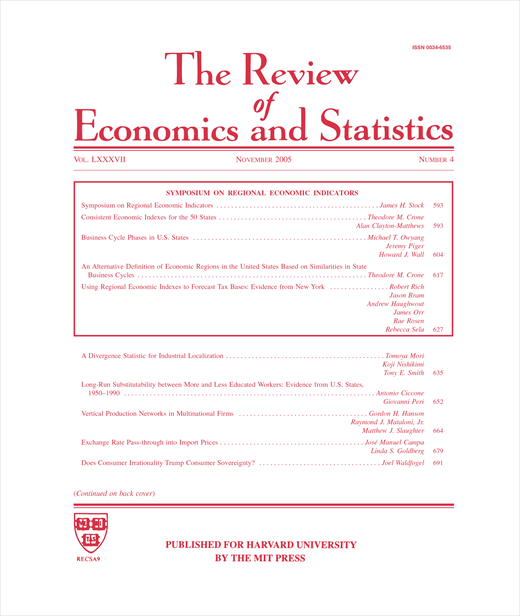
Sticky Prices or Sticky Wages? An Equivalence Result
in: Review of Economics and Statistics, forthcoming
Abstract
<p>We show an equivalence result in the standard representative agent New Keynesian model after demand, wage markup and correlated price markup and TFP shocks: assuming sticky prices and flexible wages yields identical allocations for GDP, consumption, labor, inflation and interest rates to the opposite case- flexible prices and sticky wages. This equivalence result arises if the price and wage Phillips curves' slopes are identical and generalizes to any pair of price and wage Phillips curve slopes such that their sum and product are identical. Nevertheless, the cyclical implications for profits and wages are substantially different. We discuss how the equivalence breaks when these factor-distributional implications matter for aggregate allocations, e.g. in New Keynesian models with heterogeneous agents, endogenous firm entry, and non-constant returns to scale in production. Lastly, we point to an econometric identification problem raised by our equivalence result and discuss possible solutions thereof.</p>

Transparency and Forecasting: The Impact of Conditioning Assumptions on Forecast Accuracy
in: Applied Economic Letters, forthcoming
Abstract
<p>This study investigates the impact of inaccurate assumptions on economic forecast precision. We construct a new dataset comprising an unbalanced panel of annual German GDP forecasts from various institutions, taking into account their underlying assumptions. We explicitly control for different forecast horizons to reflect the information available at the time of release. Our analysis reveals that approximately 75% of the variation in squared forecast errors can be attributed to the variation in squared errors of the initial assumptions. This finding emphasizes the importance of accurate assumptions in economic forecasting and suggests that forecasters should transparently disclose their assumptions to enhance the usefulness of their forecasts in shaping effective policy recommendations.</p>
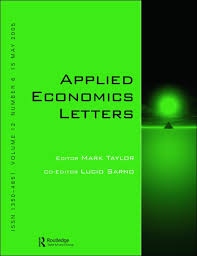
The Effects of the Iberian Exception Mechanism on Wholesale Electricity Prices and Consumer Inflation: A Synthetic-controls Approach
in: Applied Economic Letters, forthcoming
Abstract
This study employs synthetic control methods to estimate the effect of the Iberian exception mechanism on wholesale electricity prices and consumer inflation, for both Spain and Portugal. We find that the intervention led to an average reduction of approximately 40% in the spot price of electricity between July 2022 and June 2023 in both Spain and Portugal. Regarding overall inflation, we observe notable differences between the two countries. In Spain, the intervention has an immediate effect, and results in an average decrease of 3.5 percentage points over the twelve months under consideration. In Portugal, however, the impact is small and generally close to zero. Different electricity market structures in each country are a plausible explanation.
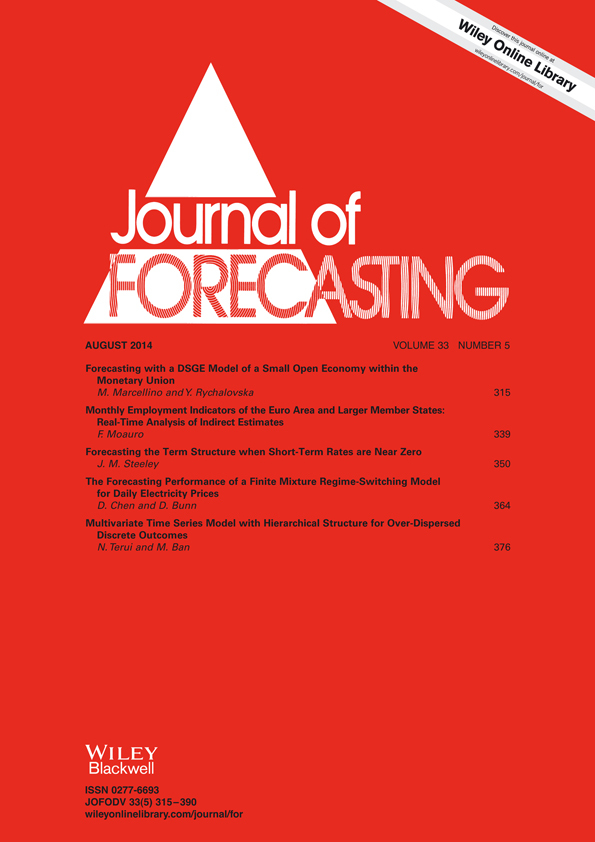
Step by Step ‒ A Quarterly Evaluation of EU Commission's GDP Forecasts
in: Journal of Forecasting, No. 3, 2025
Abstract
<p>The European Commission’s growth forecasts play a crucial role in shaping policies and provide a benchmark for many (national) forecasters. The annual forecasts are built on quarterly estimates, which do not receive much attention and are hardly known. Therefore, this paper provides a comprehensive analysis of multi-period ahead quarterly GDP growth forecasts for the European Union (EU), euro area, and several EU member states with respect to first-release and current-release data. Forecast revisions and forecast errors are analyzed, and the results show that the forecasts are not systematically biased. However, GDP forecasts for several member states tend to be overestimated at short-time horizons. Furthermore, the final forecast revision in the current quarter is generally downward biased for almost all countries. Overall, the differences in mean forecast errors are minor when using real-time data or pseudo-real-time data and these differences do not significantly impact the overall assessment of the forecasts’ quality. Additionally, the forecast performance varies across countries, with smaller countries and Central and Eastern European countries (CEECs) experiencing larger forecast errors. The paper provides evidence that there is still potential for improvement in forecasting techniques both for nowcasts but also forecasts up to eight quarters ahead. In the latter case, the performance of the mean forecast tends to be superior for many countries.</p>
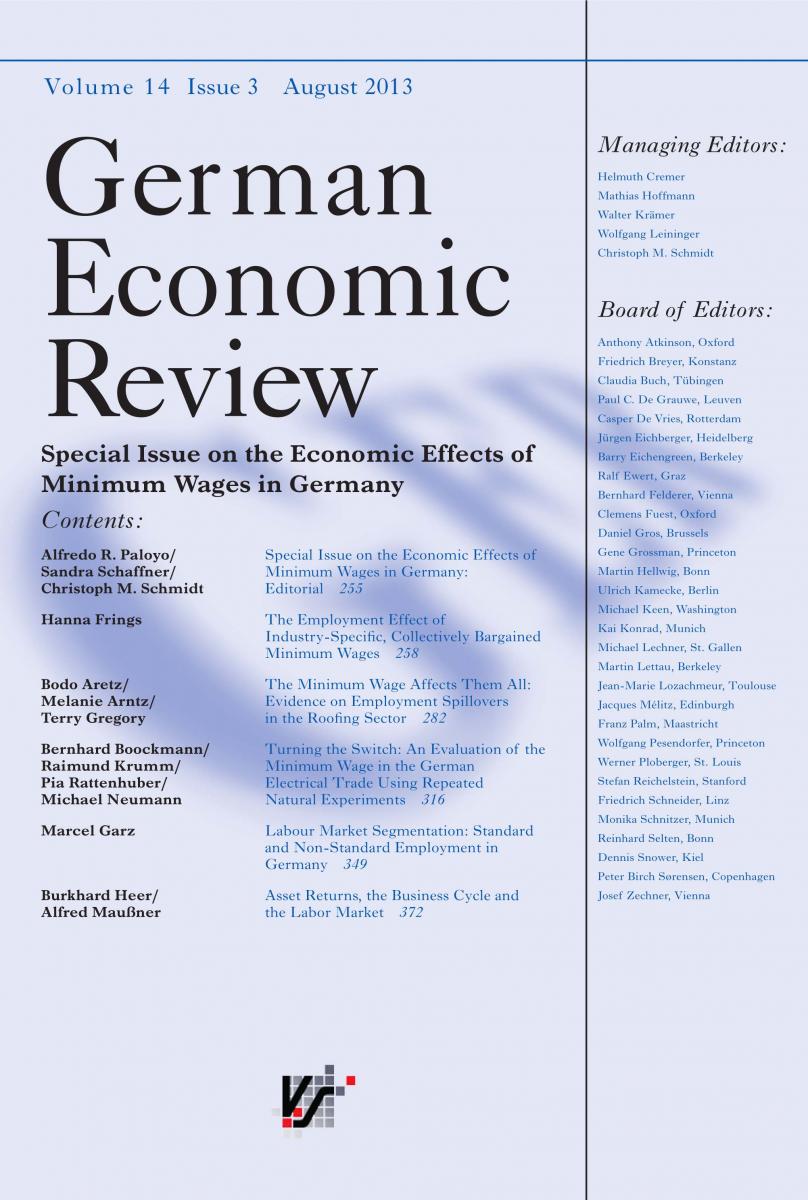
Regional Industrial Effects in Germany from a Potential Gas Deficit
in: German Economic Review, No. 3, 2024
Abstract
<p>We estimate potential regional industrial effects in case of a threatening gas deficit. For Germany, the reduction leads to a potential decrease in industrial value added by 1.6 %. The heterogeneity across German states is remarkable, ranging from 2.2 % for Rhineland-Palatinate to 0.7 % for Hamburg. We emphasize the need for regional input-output tables to conduct economic analysis on a sub-national level, particularly when regional industrial structures are heterogeneous. The approximation with national figures can lead to results that differ both in magnitude and relative regional exposure. Our findings highlight that more accurate policy guidance can be achieved by improving the regional database.</p>
Working Papers
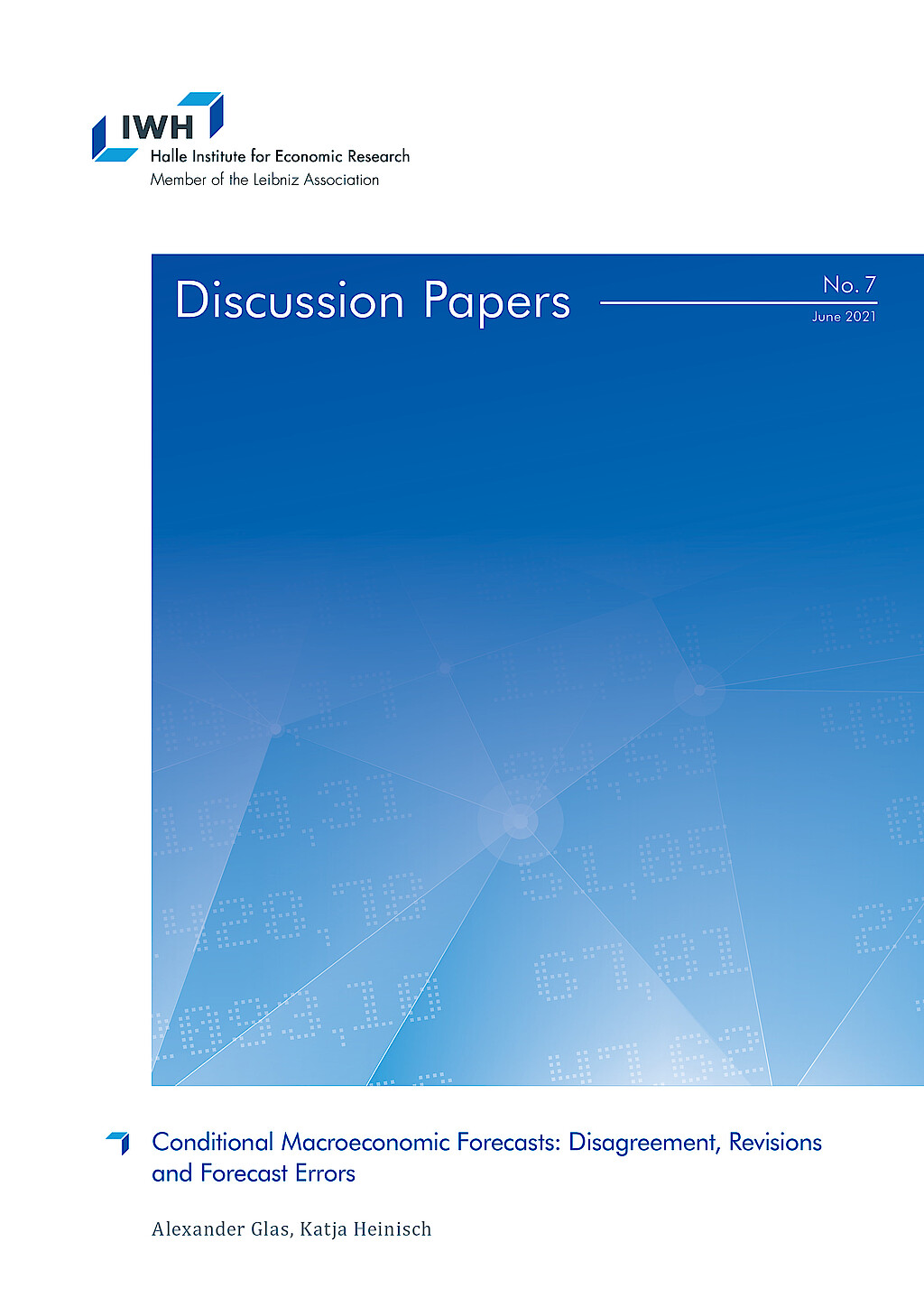
Conditional Macroeconomic Forecasts: Disagreement, Revisions and Forecast Errors
in: IWH Discussion Papers, No. 7, 2021
Abstract
Using data from the European Central Bank‘s Survey of Professional Forecasters, we analyse the role of ex-ante conditioning variables for macroeconomic forecasts. In particular, we test to which extent the heterogeneity, updating and ex-post performance of predictions for inflation, real GDP growth and the unemployment rate are related to assumptions about future oil prices, exchange rates, interest rates and wage growth. Our findings indicate that inflation forecasts are closely associated with oil price expectations, whereas expected interest rates are used primarily to predict output growth and unemployment. Expectations about exchange rates and wage growth also matter for macroeconomic forecasts, albeit less so than oil prices and interest rates. We show that survey participants can considerably improve forecast accuracy for macroeconomic outcomes by reducing prediction errors for external conditions. Our results contribute to a better understanding of the expectation formation process of experts.
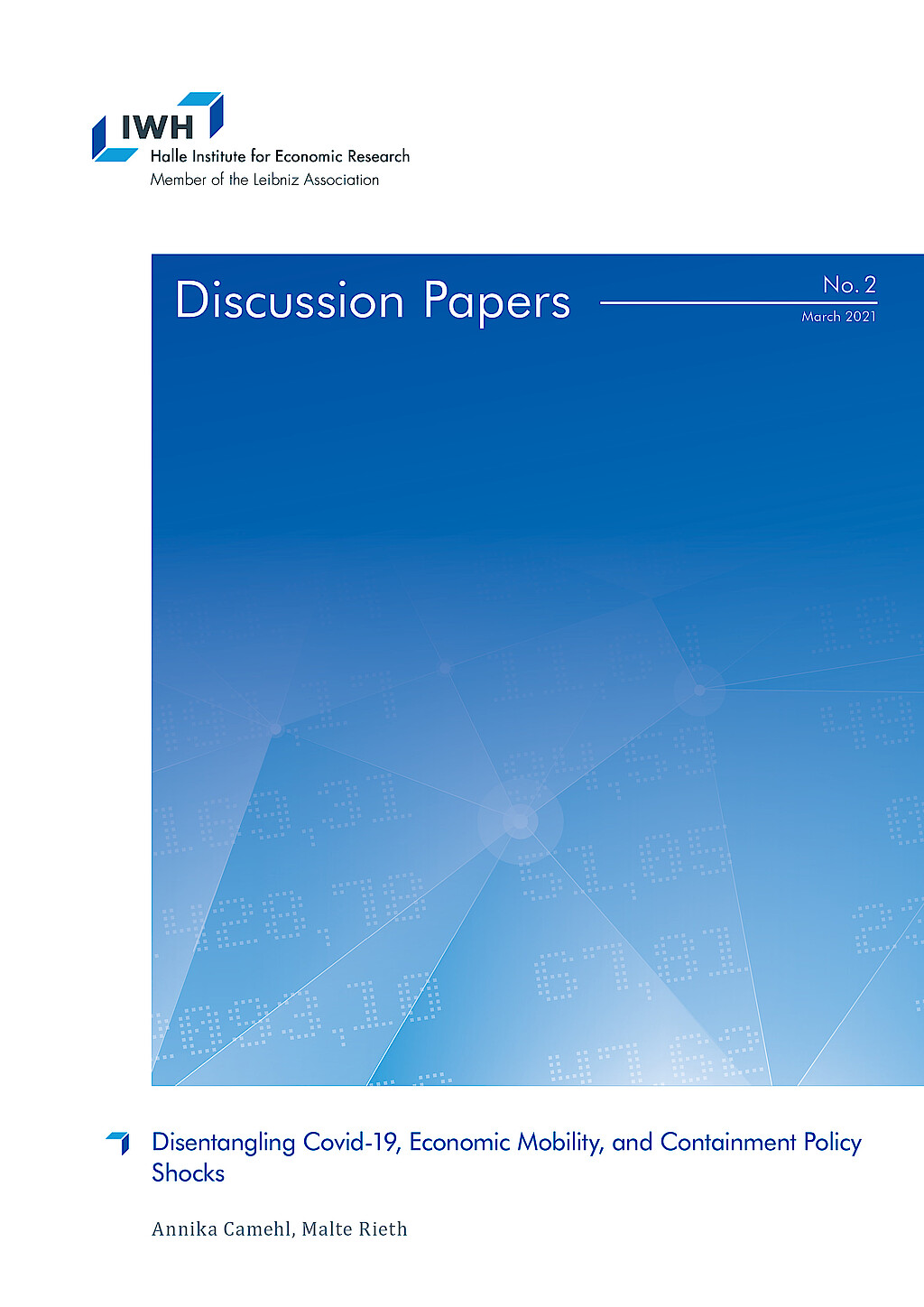
Disentangling Covid-19, Economic Mobility, and Containment Policy Shocks
in: IWH Discussion Papers, No. 2, 2021
Abstract
We study the dynamic impact of Covid-19, economic mobility, and containment policy shocks. We use Bayesian panel structural vector autoregressions with daily data for 44 countries, identified through sign and zero restrictions. Incidence and mobility shocks raise cases and deaths significantly for two months. Restrictive policy shocks lower mobility immediately, cases after one week, and deaths after three weeks. Non-pharmaceutical interventions explain half of the variation in mobility, cases, and deaths worldwide. These flattened the pandemic curve, while deepening the global mobility recession. The policy tradeoff is 1 p.p. less mobility per day for 9% fewer deaths after two months.
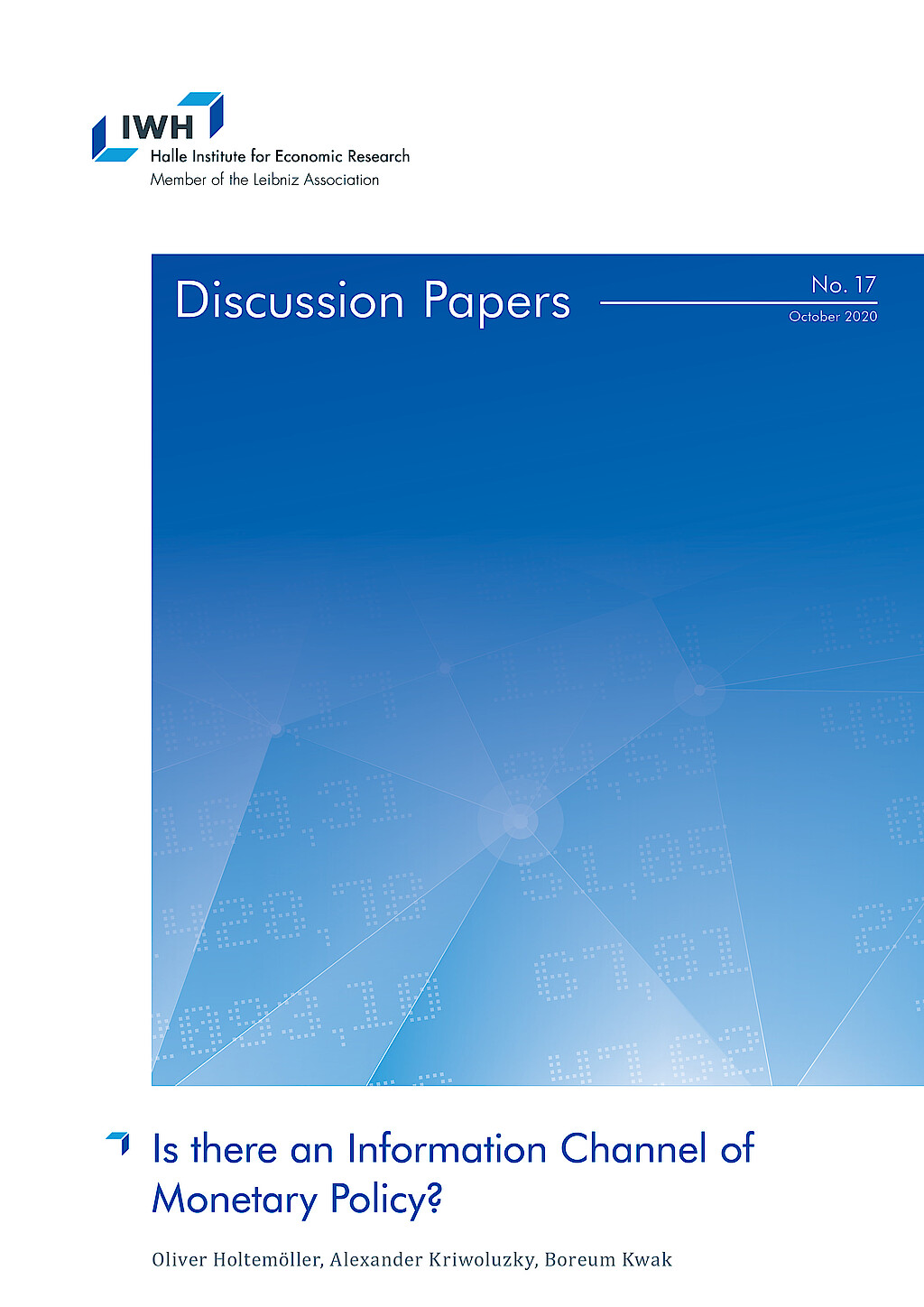
Is there an Information Channel of Monetary Policy?
in: IWH Discussion Papers, No. 17, 2020
Abstract
Exploiting the heteroscedasticity of the changes in short-term and long-term interest rates and exchange rates around the FOMC announcement, we identify three structural monetary policy shocks. We eliminate the predictable part of the shocks and study their effects on financial variables and macro variables. The first shock resembles a conventional monetary policy shock, and the second resembles an unconventional monetary shock. The third shock leads to an increase in interest rates, stock prices, industrial production, consumer prices, and commodity prices. At the same time, the excess bond premium and uncertainty decrease, and the U.S. dollar depreciates. Therefore, this third shock combines all the characteristics of a central bank information shock.
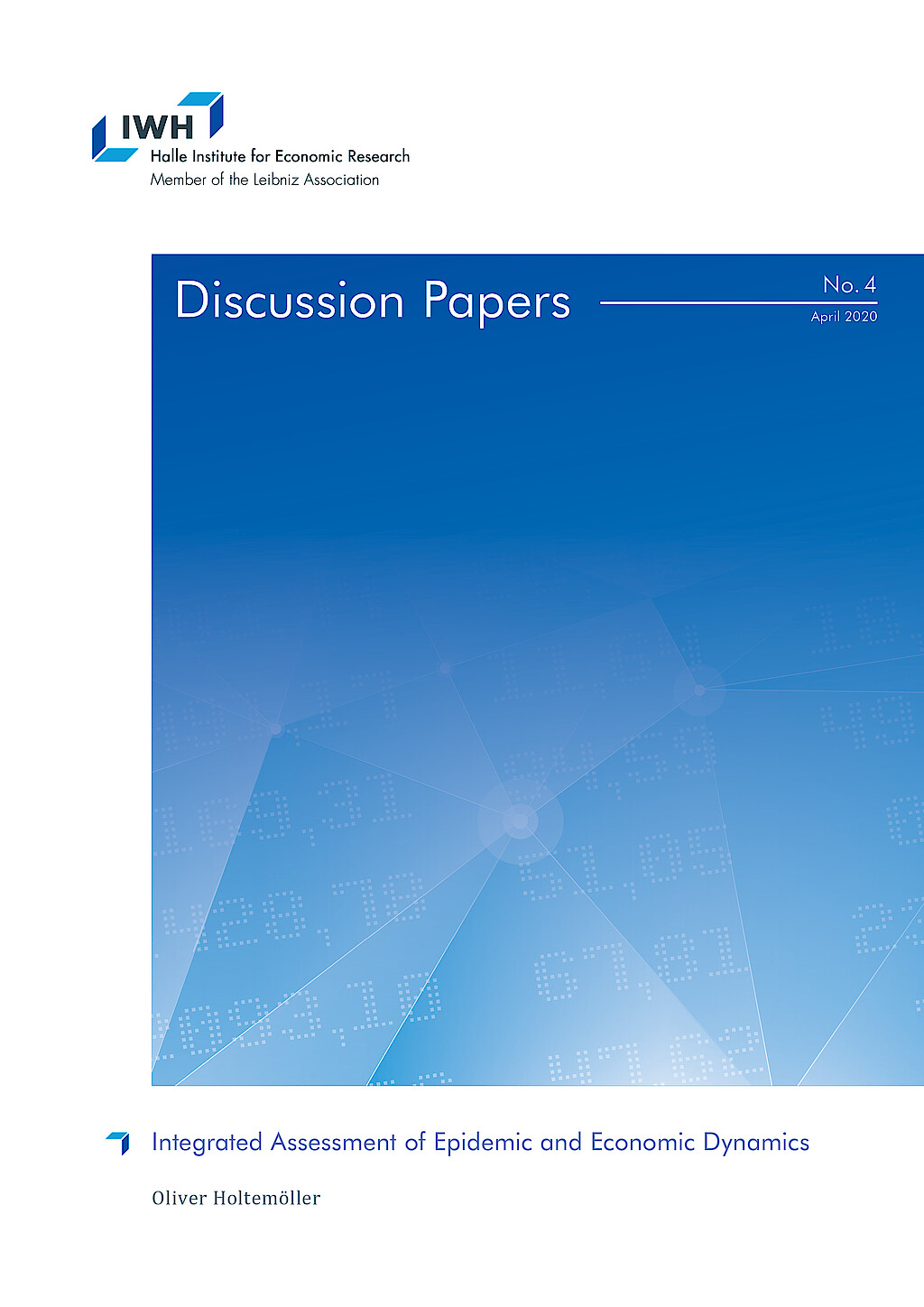
Integrated Assessment of Epidemic and Economic Dynamics
in: IWH Discussion Papers, No. 4, 2020
Abstract
In this paper, a simple integrated model for the joint assessment of epidemic and economic dynamics is developed. The model can be used to discuss mitigation policies like shutdown and testing. Since epidemics cause output losses due to a reduced labor force, temporarily reducing economic activity in order to prevent future losses can be welfare enhancing. Mitigation policies help to keep the number of people requiring intensive medical care below the capacity of the health system. The optimal policy is a mixture of temporary partial shutdown and intensive testing and isolation of infectious persons for an extended period of time.
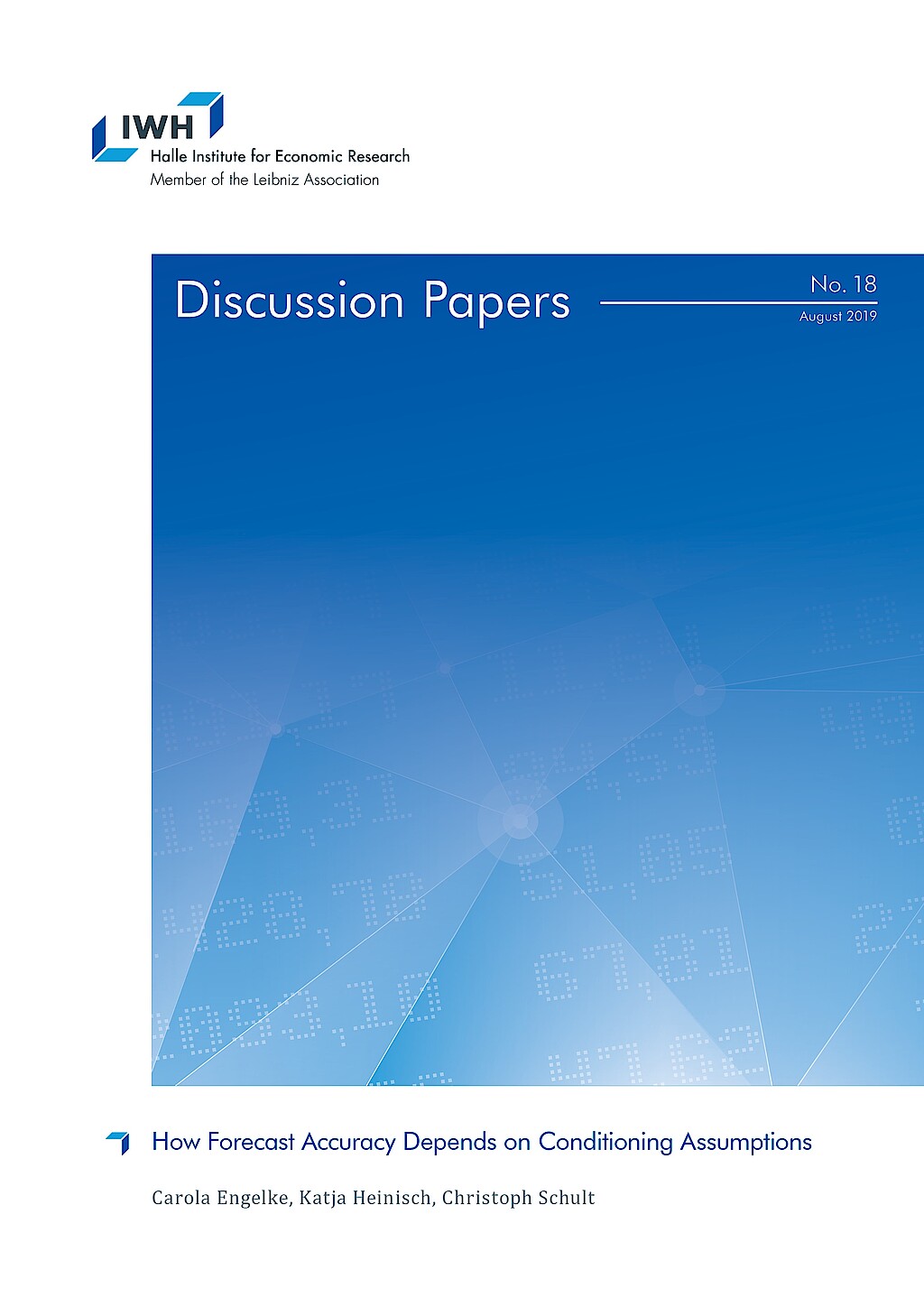
How Forecast Accuracy Depends on Conditioning Assumptions
in: IWH Discussion Papers, No. 18, 2019
Abstract
This paper examines the extent to which errors in economic forecasts are driven by initial assumptions that prove to be incorrect ex post. Therefore, we construct a new data set comprising an unbalanced panel of annual forecasts from different institutions forecasting German GDP and the underlying assumptions. We explicitly control for different forecast horizons to proxy the information available at the release date. Over 75% of squared errors of the GDP forecast comove with the squared errors in their underlying assumptions. The root mean squared forecast error for GDP in our regression sample of 1.52% could be reduced to 1.13% by setting all assumption errors to zero. This implies that the accuracy of the assumptions is of great importance and that forecasters should reveal the framework of their assumptions in order to obtain useful policy recommendations based on economic forecasts.


























